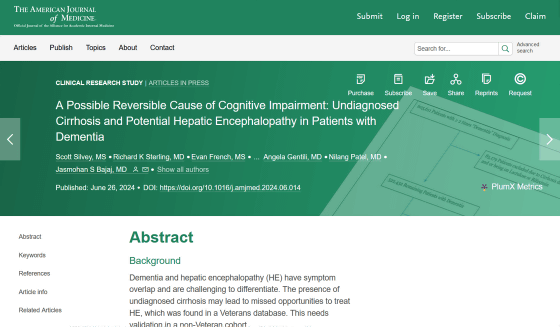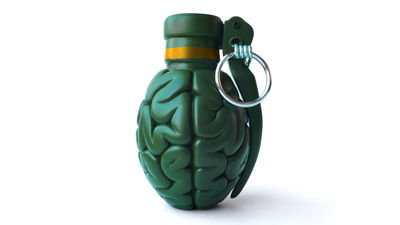Research shows that about 13% of people diagnosed with dementia may actually have 'treatable liver disease'

As the aging of modern society progresses, dementia is becoming an increasingly serious social problem. However, a new study that analyzed data from approximately 69,000 people diagnosed with dementia in the United States showed that approximately 13% of people diagnosed with dementia may not actually have dementia, but rather a 'treatable liver disease.'
A Possible Reversible Cause of Cognitive Impairment: Undiagnosed Cirrhosis and Potential Hepatic Encephalopathy in Patients with Dementia - The American Journal of Medicine

13 percent of patients with dementia may instead have cognitive decline from cirrhosis | VCU Health
https://www.vcuhealth.org/news/13-percent-of-patients-with-dementia-may-instead-have-cognitive-decline-from-cirrhosis
Up to 13% of Dementia Cases May Be a Misdiagnosed Treatable Condition : ScienceAlert
https://www.sciencealert.com/up-to-13-of-dementia-cases-may-be-a-misdiagnosed-treatable-condition
The liver is responsible for producing digestive juices and removing chemicals from the blood, and various problems can arise when liver function is impaired by excessive alcohol consumption, obesity, diabetes, stress, aging, etc.
One of the diseases caused by decreased liver function is ' hepatic encephalopathy .' This is a condition in which toxins in the blood that would normally be removed by the liver are not removed due to decreased liver function, and the toxins reach the brain.
When the toxins reach the brain, cognitive decline, personality changes, and depression can occur, and as the condition progresses, it can lead to decreased alertness and confusion. Dementia and hepatic encephalopathy often share symptoms that overlap, making it difficult for doctors to distinguish between the two conditions.

A research team from
By focusing on the FIB-4 score, which evaluates the degree of progression of liver fibrosis linked to cirrhosis, the researchers found that about 13% of patients diagnosed with dementia were likely to have cirrhosis. The research team reported that these patients may not actually have dementia, but may instead be suffering from cognitive decline due to hepatic encephalopathy.
There have already been reported cases in which patients with hepatic encephalopathy who were misdiagnosed with dementia experienced improvement in cognitive function after receiving drug treatment with rifaximin and other drugs, so it seems possible that many patients will be able to recover their cognitive function if a proper diagnosis is made.

'This significant association between dementia and emotional health highlights the importance of screening for potentially treatable factors of cognitive decline,' said Jasmohan Bajaj , a hepatologist at Virginia Commonwealth University, concluding that early detection of hepatic encephalopathy is key.
Related Posts:
in Free Member, Science, Posted by log1h_ik







